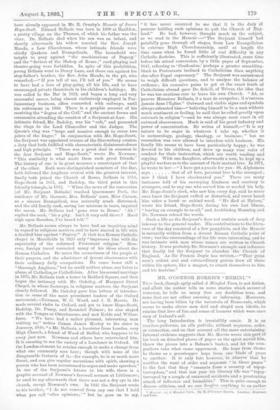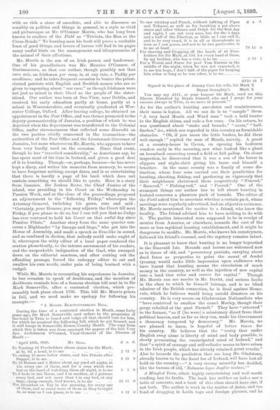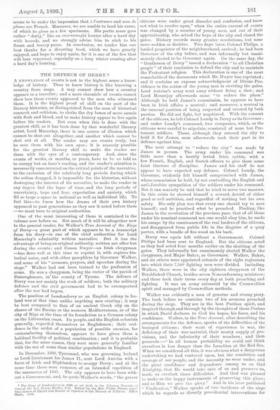MR. O'CONNOR MORRIS'S " MEMINI."* THIS book, though aptly called
A Mingled Yarn, is not fiction, and albeit the author tells us some stories which savour of romance, he tells us many that are doubtless true, and none that are not either amusing or informing. Moreover, not having been bitten by the tarantula of Home-rule, which seems to make clever men dull and stupid men idiotic, he. retains that love of fun and sense of humour which were once racy of Ireland's soil.
The long Introduction is irresistibly comic. It is an ommium.gatherum, an olla podrida, without sequence, order, or connection, and on that account all the more entertaining. Internal evidence suggests that Mr. Morris wrote this part of his book on detached pieces of paper as the spirit moved him, threw the pieces into a Balaam's basket, and let the com- positors take what came uppermost. He hops from theme to theme as a grasshopper hops from one blade of grass to another. It is only fair, however, to observe that he ascribes the want of order and sequence " in these pages " to the fact that they " emanate from a country of topsy- turveydom," and that last year his literary life was " topsy- turveyed by a couple of untoward accidents and a prostrating attack of influenza and bronchitis." This is quite enough to disarm criticism, and we can forgive anything to an author
or, A Mingled Yarn. By M. O'Connor Morris. London Harrison and Sons.
with so rich a store of anecdote, and able to discourse so sensibly on politics and things in general, in a style so vivid and picturesque as Mr. O'Connor Morris, who has long been known to readers of the Field as " Triviata, the Man at the Cross-Roads." To hunting-men his book will prove a veritable feast of good things, and lovers of horses will find in its pages many useful hints on the management and idiosyncracies of the animal of their affections.
Mr. Morris is the son of an Irish parson and landowner. One of his grandfathers was Mr. Maurice O'Connor, of Gurtnamorra, so that our author, though possibly not that rara avie, an Irishman pur sang, is, at any rate, a Paddy par excellence; and he takes frequent occasion to banter the priest- elected patriots with English and Scottish names who are so given to vapouring about " our race," as though Irishmen were not just as mixed in their blood as the people of the sister- island. Our author was born at Sea-View, near Dublin, and received his early education partly at home, partly at a school in Worcestershire, and eventually graduated at Wor- cester College, Oxford. After leaving college, he obtained an appointment in the Post Office, and was thence promoted to the deputy-postmastership of Jamaica, a position of which he was deprived when the department was transferred to the Colonial Office, under circumstances that reflected some discredit on the two parties chiefly concerned in the transaction—the authorities of the Post Office and the Lieutenant-Governor of Jamaica, but none whatever on Mr. Morris, who appears to have been very hardly used on the occasion. Since that event, though he has " travelled considerably," as Americans say, he has spent most of his time in Ireland, and given a good deal of it to bunting. Though—or, perhaps, because—he has never kept a diary, and writes his memoirs from memory, he seems to have forgotten nothing, except dates, and is so entertaining that there is hardly a page of his book which does not contain something we should like to quote. Here is a story from Jamaica. Sir Joshua Rowe, the Chief Justice of the island, was presiding in his Court on the Wednesday in Passion Week, and at the close of the proceedings, proposed an adjournment to the "following Friday," whereupon the Attorney-General, twitching his gown, rose and said : "Certainly, your Honour, you may adjourn the Court till next Friday, if you please to do so, but I can tell you that no Judge has ever ventured to hold his Court on that awful day since Pontius Pilate." Another story from the same quarter con- cerns a Highlander " by lineage and lingo," who got into the House of Assembly, and made a speech so Erse-like in sound, and so confused in diction, that nobody could make aught of it, whereupon the witty editor of a local paper rendered the oration phonetically, to the intense amusement of his readers, and the unspeakable indignation of the Gael, who swooped down on the editorial sanctum, and after cutting out the offending passage, forced the unhappy editor to eat and swallow his own words, under pain of being brained with a cudgel.
While Mr. Morris is recounting his experiences in Jamaica, he has occasion to speak of doubloons, and the mention of -doubloons reminds him of a famous election bill sent in to Sir Mark Somerville, after a contested election, which pre- sumably took place about 1786. This bill Mr. Morris prints in fall, and we need make no apology for following his example :— A MODEL ELECTIONEERING BILL.
During the time of a contested election in Meath, some forty years ago, Sir Mark Somerville sent orders to the proprietor of the hotel in Trim to board and lodge all that should vote for him, for which he received the following bill, which he got framed, and it still hangs in Somerville House, County Meath. The copy from which this is taken was from amongst the papers of the late Very Rev. Archdeacon O'Connel, Vicar-General of the Diocese of Meath :— ' April 16th, 1826. My BILL.
To Tenting 16 Freeholders above stairs for Sir Mark,
s. d.
at 3s. 3d. a head, is to me ... • •• 2 12 0 To eating 15 more below stairs, and two Priests after
Supper, is to me ... 2 15 9 To 18 Horses and 5 Mules about my yard all night, at 13s. every one of them, and for a man which was lost on the head of watching them all night, is to me 5 6 0 To 6 beds in one Room, and 4 in another, at 2 guineas every bed, and not more than 4 in any bed, at any time, cheap enough, God knows, is to me 22 15 0 For Breakfast on Tay in the morning, for every one of them, and as many more of them as they brought in, as near as I can guess, is to me ... 4 12 0 To raw whiskey and Punch, without talking of Pipes and Tobacco, as well as for breaking a pot above stairs and other Glasses and Delph for the first day and night, I am not very sure, but for the 3 days and a half of the Election, as little as I can call it, and to be very exact, it is in all or thereabouts as near as I can guess, and not to be two particular, is to me at least £ 79 a, 15 d.
9 For shaving and Cropping off the heads of 49 Free- holders for Sir Mark, at 13d. for every head of them, by my brother, who has a vote, is to me 2 13 1 For a Womit and Nurse for poor Tom Kernan in the middle of the night, when he was not expected, is to me ten hogs, i don't talk of the piper for keeping him sober so long as he was sober, is to me
£110 18 7 Signed in the place of Jemmy Cars his wife, his Mark X Bryan Geraghty's Mark X You may say 4111, so your honour Sir Mark, send me this Eleven Hundred by Bryan himself, who and I prays for your success always in Trim, so no more at present.'"
As for the author's hunting anecdotes and reminiscences, their name is legion. All we can do is to " sample " them. " A very hard Meath and Ward man" took a bold hunter to the English shires, and rode a few runs. On his return, he was questioned about " stake and bounds," " oxers," " bull- finches," &c., which are regarded in this country as formidable obstacles. " Oh, if you mean the little bushes, he did them well enough 1" replied the man of Meath, naïvely. A guest at a country-house in Cavan, on opening his bedroom window early in the morning, saw what looked like a ghost on horseback careering round a field at full gallop. On closer inspection, he discovered that it was a son of the house in slippers and night-shirt giving his horse and himself a breather. In the same county was a family of some dis- tinction, whose four sons carried out their proclivities for hunting, shooting, fishing, and gardening so vigorously that their neighbours christened them respectively " Nimrod," " Ramrod," " Fishing-rod," and " Pearod." One of the strangest things our author has to tell about hunting in Ireland concerns a phantom pack of hounds. The editor of the Field asked him to ascertain whether a certain pack, whose meetings were regularly advertised, had an objective existence. Mr. Morris mentioned the matter to a friend, who knew the locality. The friend advised him to have nothing to do with it. The parties interested were supposed to be in receipt of monies from America, or elsewhere, towards the cost of the more or less mythical bunting establishment, and it might be dangerous to meddle. Mr. Morris, who knows his countrymen, followed his friend's counsel, and the mystery remains intact.
It is pleasant to know that hunting is no longer boycotted in the Emerald Isle. Hounds and horses are welcomed now as in times of old, and " peroratory patriots, carrying about dead foxes as properties to point the moral of feudal tyranny, would make little impression upon audiences who have learnt that hunting means the circulation of much money in the country, as well as the injection of new capital into a land that ories and craves for capital." Though Mr. Morris can see merits in Mr. Devitt, and serious faults in the class to which he himself belongs, and is no blind admirer of the British connection, he is dead against Home- rule, which he believes would bring untold disasters on his country. Re is very severe on Gladstonian Nationalists who "have contrived to swallow the camel Morley, though their gorge rebelled at the gnat Parnell." They have " attorned " to the former, "as if [he were] a missionary direct from their political heaven, and as far as they can, made his Government a theocracy tempered by democracy." Mr. Morris, we are pleased to learn, is hopeful of better times for his country. He believes that the " verity that under English sway alone is liberty of mind and body possible, is slowly permeating the emancipated mind of Ireland," and that " a spirit of courage and self-reliaffce seems to have arisen in the Irish people, which has already attained great results." Also he hazards the prediction that ere long Mr. Gladstone, already known to be the fiscal foe of Ireland, will have lost all hold on the country :—" A very strong minority has decided, like the barons of old, Nolumus leges Anglia lnutari.'" A Mingled Yarn, albeit highly entertaining and well worth reading, has its faults. The book has neither an index nor a table of contents, and a book of this class should have one, if not both. The author is weak in the matter of dates, and too fond of dragging in Latin tags and foreign phrases, and he seems to be under the impression that a l'outrunce and nom de _plume are French. Moreover, we are unable to laud his verse, of which he gives us a few specimens. His poetic muse goes rather " dotty," like an overwrought hunter after a hard day with hounds, and we strongly advise him to stick to his fluent and breezy prose. In conclusion, we tender him our best thanks for a diverting book, which we have greatly enjoyed, and hope to enjoy again, for it is one of the few that will bear reperusal, especially on a long winter evening after a hard day's hunting.




































 Previous page
Previous page